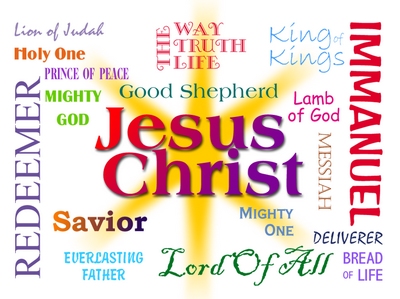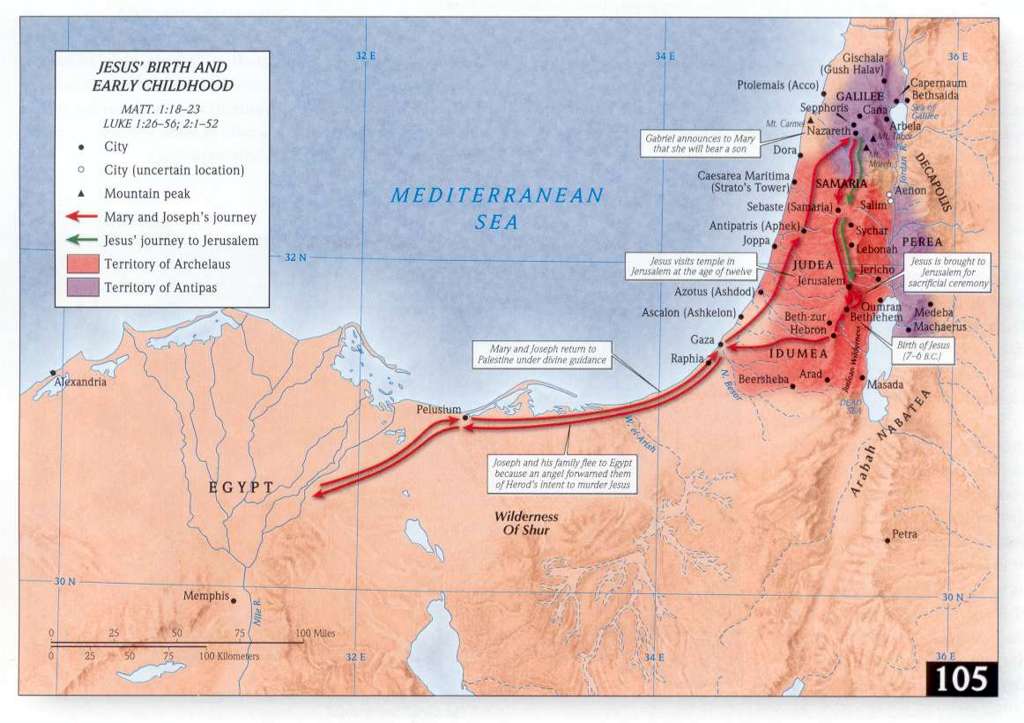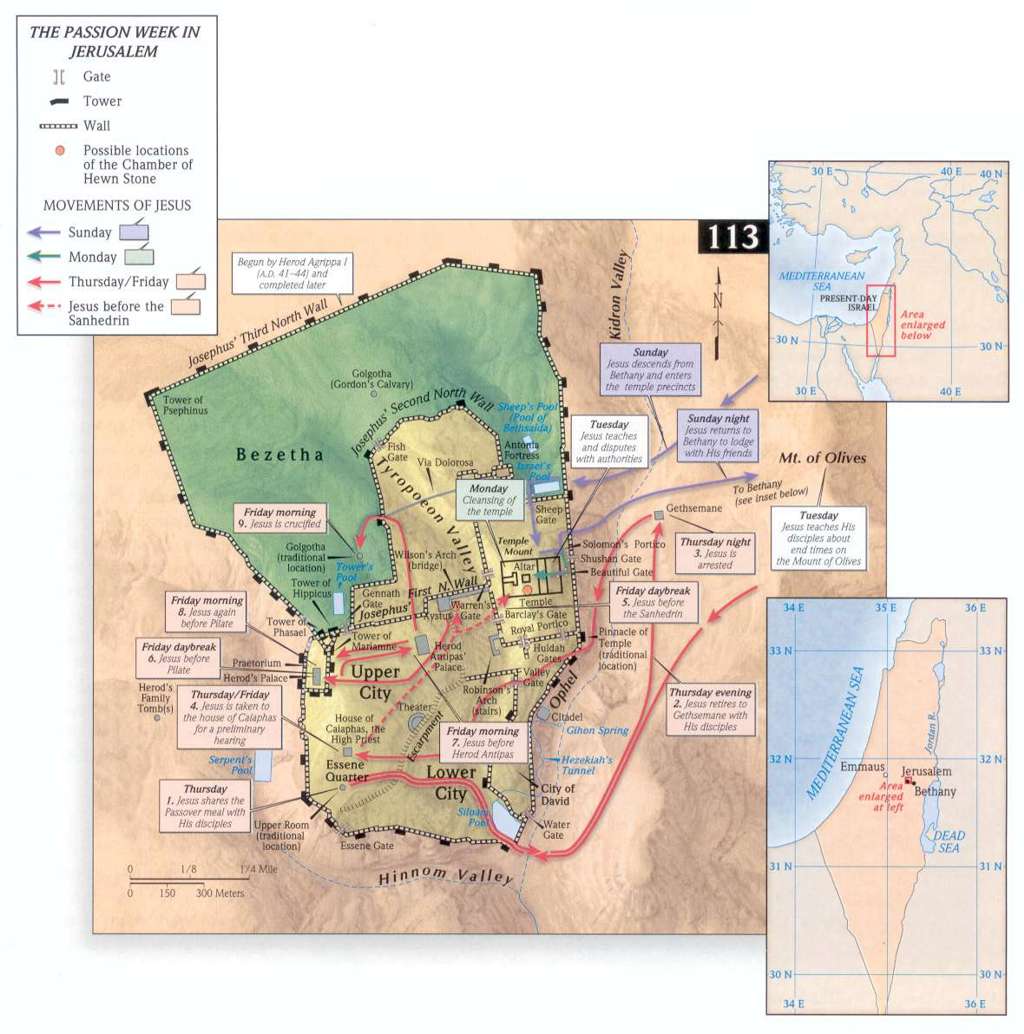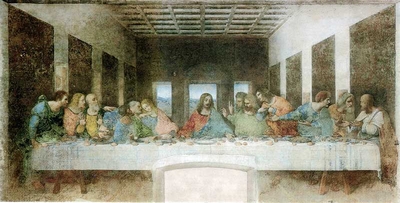 Who was Jesus ?
Who was Jesus ?
 One Solitary Life
One Solitary Life
H e was born in an obscure village, the son of a peasant woman.
He grew up in another village, where he worked in a carpenter's shop until he was thirty. Then for three years he became a wandering preacher.
He never wrote a book. He never held an office. He never had a family or owned a house. He didn't go to college. He never visited a big city. He never travelled two hundred miles from the place where he was born. He did none of those things one usually associates with greatness. He had no credentials but himself.
He was only thirty-three when the tide of public opinion turned against him. His friends ran away. He was turned over to his enemies and went through a mockery of a trial. He was executed by the state. While he was dying, his executioners gambled for his clothing, the only property he had on earth. When he was dead he was laid in a borrowed grave through the pity of a friend.
Twenty one centuries have come and gone, and today he is the central figure of the human race and the leader of mankind's progress. All the armies that ever marched, all the navies that ever sailed, all the parliaments that ever sat, all the kings that ever reigned, put together, have not affected the life of man on this earth as much as that One Solitary Life.
The primary sources for the details of Jesus' life are found in the four gospels of Matthew, Mark, Luke and John, which were written approximately between 60 and 90 A.D. However, mention is made of Jesus' in writings outside of the gospels. Both the Roman Historian Tacitus (c.55-120), and the Jewish writer Josephus (c.37-100), mention Jesus' death by crucifixion. Further information on this, and also answers to common questions about Jesus Christ, are found on the Christianity Q and A page.

The names of Jesus Christ, as mentioned in the Bible.
 The birth and early life of Jesus
The birth and early life of Jesus
Jesus Christ was born around 4 B.C. in the town of Bethlehem, a town that was also the Birthplace of David, one of Israel's greatest kings. His first name is a Greek form of the Hebrew name Joshua or Yeshua, which means 'The Lord is Salvation'. The title 'Christ' comes from the Greek christos : 'Anointed one'. The Hebrew term Yeshua HaMashiach translates as 'Jesus the Messiah'.
In both the gospels of Matthew and Luke we find details of Jesus' family tree. An extensive list is provided, indicating Jesus was of the house of David and thus fulfilling the messianic prophecies of Psalm 132:11 and Jeremiah 23:5.
The gospels stress the miraculous nature of Jesus' birth as the son of Mary, a virgin. Again, this fulfilled a messianic prophecy (Isaiah 7:14).
"And the angel said unto her, Fear not, Mary: for thou hast found favour with God. And, behold, thou shalt conceive in thy womb, and bring forth a son, and shalt call his name JESUS. He shall be great, and shall be called the Son of the Highest: and the Lord God shall give unto him the throne of his father David: And he shall reign over the house of Jacob forever; and of his kingdom there shall be no end."
Luke 1:30-33 (KJV).
Jesus' birth as one who would be 'King of the Jews' represented a serious challenge to the Jewish king Herod the Great (c.73 - 4 BC). Herod therefore initiated a massacre of all children under the age of two, in order to remove any threat. Matthew's gospel tells us that Joseph, Jesus' father, had been warned by an angel and so Mary, the Baby Jesus and himself (often referred to collectively as the Holy Family) all fled into Egypt (Matthew 2:14).
Following Herod's death, Jesus and his family returned to Israel, eventually settling in a city called Nazareth (Matthew 2:23). From this time onward until Jesus was about 30, the gospels give no further information as to Jesus' life, apart from Luke 2:42-52, where Jesus is found in the temple at Jerusalem, discussing and debating with the Jewish religious teachers.
Click each image below to enlarge, click again to close.
 Jesus birth and early years
Jesus birth and early years
 Palestine in the time of Jesus
Palestine in the time of Jesus
 The events of Passion week
The events of Passion week
 The start of Jesus' public ministry
The start of Jesus' public ministry
All the gospels refer to Jesus' Baptism by John the Baptist in the River Jordan, an event marking the beginning of Jesus' public ministry.
"And it came to pass in those days, that Jesus came from Nazareth of Galilee, and was baptized of John in Jordan. And straightway coming up out of the water, he saw the heavens opened, and the Spirit like a dove descending upon him: And there came a voice from heaven, saying, Thou art my beloved Son, in whom I am well pleased."
Mark 1:9-11 (KJV).
Jesus' baptism was followed by a period of forty days, spent in a wilderness area successfully resisting the temptations of the devil (Luke 4:3-12). His ministry began in earnest in the region of Galilee (what is now the northern part of Israel). Matthew, Mark and Luke all give details of the calling of a select group of twelve men (known as Disciples, a word meaning 'pupil' or 'learner'). This group would later be sent out by Jesus as Apostles (Greek: 'One who is sent') in what Christians call the 'Great Commission':
"Go ye therefore, and teach all nations, baptizing them in the name of the Father, and of the Son, and of the Holy Ghost: Teaching them to observe all things whatsoever I have commanded you: and, lo, I am with you always, even unto the end of the world. Amen."
Matthew 28:19-20 (KJV).
A turning point in the ministry came in Matthew 16:16, where one of Jesus' disciples (Peter) states his belief that Jesus is Christ, Son of God. This revelation is later confirmed at Jesus transfiguration:
"...And was transfigured before them: and his face did shine as the sun, and his raiment was white as the light. And, behold, there appeared unto them Moses and Elijah talking with him. Then answered Peter, and said unto Jesus, Lord, it is good for us to be here: if thou wilt, let us make here three tabernacles; one for thee, and one for Moses, and one for Elijah. While he yet spake, behold, a bright cloud overshadowed them: and behold a voice out of the cloud, which said, This is my beloved Son, in whom I am well pleased; hear ye him."
Matthew 17:2-5 (KJV).
 Jesus teaching and miracles
Jesus teaching and miracles
In John 2, we read of the first of Jesus' miracles: the turning of water in wine at a wedding in Cana. Several other miracles are mentioned in the gospels including the feeding of the 5,000 (found in all four gospels) and the raising of Lazarus from the dead (John 11:1-44). His miraculous worked aroused opposition as well as support.
In Matthew 9:2 we read of the healing of a paralyzed man. Here the gospel writers indicate Jesus' claim to be more than a worker of miracles: he claims forgiveness of sin for the man, something which immediately aroused suspicion as Jewish law mandated that only God could forgive sins. Jesus' teaching was distinctive: he preached forgiveness (Luke 6:28), mutual love (John 13:34) and claimed that belief in him would give eternal life (John 6:40).
 Jesus final week
Jesus final week
Jesus' final week began with his entry into Jerusalem for the Passover, one of the most important dates in the Jewish calendar. In John 12:13 we read that Jesus was received by a crowd waving palms and acclaiming him 'King of Israel'. In Mark 11, we read of Jesus' overturning the tables of moneychangers in the temple. On seeing this, Jesus authority was challenged by the Jewish authorities, who sought to have him arrested. Later in Luke 22:2-3 we read of a conspiracy between the chief priests, scribes and Judas, one of Jesus' disciples.
On Thursday, Jesus ate his last meal with the twelve. In what is known as the 'Last Supper', Jesus clearly talks about his imminent betrayal and death. In what is one of the most significant passages in the Bible, Jesus talks of the Bread and the Wine of the meal as being his body and blood. Christians everywhere remember this in the Eucharist (Greek: 'Thanksgiving'), also known as 'Holy Communion' or the 'Lord's Supper'.

The Last Supper, by Leonardo da Vinci (1452-1519).
"And as they were eating, Jesus took bread, and blessed it, and broke it, and gave it to the disciples, and said, Take, eat; this is my body. And he took the cup, and gave thanks, and gave it to them, saying, Drink ye all of it; For this is my blood of the new testament, which is shed for many for the remission of sins. But I say unto you, I will not drink henceforth of this fruit of the vine, until that day when I drink it new with you in my Father's kingdom."
Matthew 26:26-29 (KJV).
Following the last supper, Jesus went to the Garden of Gethsemane to pray. The gospel writers graphically portray the intense anguish Jesus felt as he prepared for his coming suffering and death. Luke 22:44 refers to Jesus sweat being like blood (a condition known medically as hematohidrosis), as a result of his situation. Jesus is then arrested and put on trial before the supreme Jewish council or Sanhedrin. In Mark 14:62, Jesus affirms his messiahship, leading to his condemnation by the Sanhedrin on a charge of blasphemy.
The Jewish council wished to have Jesus condemned to death, but being unable to carry out the death sentence themselves, they handed Jesus over to Pontius Pilate, the Roman governor. The gospels portray Pilate as hesitant to find Jesus' guilty, so in an act aimed to satisfy those hungry for the death sentence, Jesus is first flogged.
Flogging was a common punishment enforced by the Roman authorities, usually as a prelude to crucifixion. Usually the victim would be tied to a post and soldiers took it in turns to beat the victim with a flagellum or whip, made with pieces of bone or metal at the ends. Such a whip would easily lacerate the skin and some of the victims did not survive such a heavy beating.
Following Jesus' flogging, Pilate brought Jesus back and presented him again to the crowd. The Roman custom was to release one prisoner at passover and Pilate offered the crowd a choice between Jesus and Barabbas, who had been arrested on a charge of leading a revolt. Again Pilate is portrayed as hesitant, but to avoid a riot, he condemns Jesus to death, after stressing he was innocent in the matter (Matthew 27:24).
 The Crucifixion
The Crucifixion
Crucifixation was employed by the Roman authorities as a severe form of punishment and a deterrent. Only common criminals and non-Roman citizens were crucified. The victim would be forced to carry their own cross (either the whole cross itself or the top beam) to the site of the crucifixion. In Jesus' case, all four gospels mention this to be Golgotha (Aramaic: 'skull'), which was a hill outside of Jerusalem.
The victim would then be either tied or nailed to the cross, which would then be placed upright. Left in this position, they would have difficulty breathing and death, when it came, might take several days. To hasten death, Roman soldiers would sometimes break the legs of a crucified person. In Jesus' case, this was not necessary as he died quickly.
"And it was about the sixth hour, and there was a darkness over all the earth until the ninth hour. And the sun was darkened, and the veil of the temple was rent in the midst. And when Jesus had cried with a loud voice, he said, Father, into thy hands I commend my spirit: and having said thus, he gave up the ghost. Now when the centurion saw what was done, he glorified God, saying, Certainly this was a righteous man."
Luke 23:44-47(KJV).

The Crucifixion, by Van Dyck (1599-1641).
 The Resurrection
The Resurrection
All of the gospel writers refer to Jesus' body being placed in a tomb. The tomb belonged to Joseph of Arimathea, an influential member of the Sanhedrin. On Sunday, Jesus appears first to Mary Magdalene (Mark 16:9) and later on, to his disciples, clearly showing them the marks on his body (John 20:20). The fact that Jesus rose from the dead is pivotal to Christianity. The apostle Paul, who himself claimed to have met the risen Christ on the road to Damascus (Acts 9:4-5), indicated this in his letter to the Corinthian church:
"If in this life only we have hope in Christ, we are of all men most miserable. But now is Christ risen from the dead, and become the firstfruits of them that slept."
1 Corinthians 15:19-20 (KJV).

The Resurrection, by Sandro Botticelli (1445-1510).
 Why should I believe in him ?
Why should I believe in him ?
Here we list six reasons why, nearly 2,000 years after his death, Jesus Christ still remains an important figure in our world.
- Christ Came into the world
The heart of the Christian gospel is that Jesus Christ was sent into the world to reconcile men and women to God. Christ's death was a sacrifice, made for the sins of all mankind. In John's gospel we find what is often called 'The gospel in a nutshell':
"For God so loved the world, that he gave his only begotten Son, that whosoever believeth in him should not perish, but have everlasting life. For God sent not his Son into the world to condemn the world; but that the world through him might be saved."
John 3:16-17 (KJV). - Christ brings Hope
The hope that Christ brought is of a better world - a world where evil does not triumph over good and where peace reigns.
"To whom God would make known what is the riches of the glory of this mystery among the Gentiles; which is Christ in you, the hope of glory."
Colossians 1:27 (KJV). - Christ will Return again to the Earth
The 'second coming' of Christ is key to Christian doctrine. In Mark 13:35-37, we find Jesus cautioning his followers to be ready for his coming.
"Watch ye therefore: for ye know not when the master of the house cometh, at even, or at midnight, or at the cockcrowing, or in the morning: Lest coming suddenly he find you sleeping. And what I say unto you I say unto all, Watch."
Mark 13:35-37 (KJV). - Christ founded an Institution (The Church)
The church is a community of believers, working together in proclaiming the gospel and being the hands and feet of Christ to the world.
"And I say also unto thee, That thou art Peter, and upon this rock I will build my church; and the gates of hell shall not prevail against it. And I will give unto thee the keys of the kingdom of heaven: and whatsoever thou shalt bind on earth shall be bound in heaven: and whatsoever thou shalt loose on earth shall be loosed in heaven."
Matthew 16:18-19 (KJV). - Christ understands human Suffering
The sufferings of Christ on the cross mean that he is able to understand human suffering in a deep way. In the Bible we find the story of Job - a man who was tested by God with great suffering. Job learns that through this very suffering, God is with him.
"Who shall separate us from the love of Christ? shall tribulation, or distress, or persecution, or famine, or nakedness, or peril, or sword? As it is written, For thy sake we are killed all the day long; we are accounted as sheep for the slaughter. Nay, in all these things we are more than conquerors through him that loved us. For I am persuaded, that neither death, nor life, nor angels, nor principalities, nor powers, nor things present, nor things to come, Nor height, nor depth, nor any other creature, shall be able to separate us from the love of God, which is in Christ Jesus our Lord."
Romans 8:35-39 (KJV). - Christ enables men and women to Triumph over sin
Christian doctrine states that sin separates mankind from a holy and righteous God. However, Christ, by his sacrificial death, broke the power of sin and enabled men and women to live in confidence, knowing their sins are forgiven and that they are judged righteous in the sight of God.
"Therefore being justified by faith, we have peace with God through our Lord Jesus Christ."
Romans 5:1 (KJV).
 A Reflection on Jesus's Death
A Reflection on Jesus's Death
| Jesus Christ(Once Again) |
|---|
| Jesus Christ, I think upon Your sacrifice |
| You became nothing, poured out to death |
| Many times I've wondered at Your gift of life |
| And I'm in that place once again |
| I'm in that place once again |
| And once again I look upon the cross where You died |
| I'm humbled by Your mercy and I'm broken inside |
| Once again I thank You |
| Once again I pour out my life |
| Now You are exalted to the highest place |
| King of the heavens, where one day I'll bow |
| But for now I marvel at Your saving grace |
| And I'm full of praise once again |
| I'm full of praise once again |
| Matt Redman |
| Copyright 1995 Thankyou Music www.kingsway.co.uk |
 How do other religions see Jesus ?
How do other religions see Jesus ?
Here we look at how Jesus is viewed in Judaism, Islam, Hinduism and Buddhism.
 Judaism
Judaism
Jewish belief rejects Jesus's claims to be the son of God. The classic text underlying this belief is known in Judaism as the Shema :
"Hear, O Israel: The LORD our God is one LORD."
Deuteronomy 6:4 (KJV).
The Old Testament contains many prophecies concerning a descendant of David, who would come and deliver Israel from its enemies, restore peace and justice to the world and triumph over evil. Examples are:
"Therefore the Lord himself shall give you a sign; Behold, a virgin shall conceive, and bear a son, and shall call his name Immanuel."
Isaiah 7:14 (KJV).
"But thou, Bethlehem Ephratah, though thou be little among the thousands of Judah, yet out of thee shall he come forth unto me that is to be ruler in Israel; whose goings forth have been from of old, from everlasting."
Micah 5:2 (KJV).
Jewish belief is that these prophecies are still to be fulfilled, and will be done so when the Messiah returns for his people.
 Islam
Islam
In Islam Jesus is known as Isa and is regarded as one of many prophets, alongside Abraham, Moses and (supremely) Mohammed. His virgin birth (Quran 19:16-21) and power to work miracles (Quran 5:110) are attested to. However, being a strictly monotheistic faith, Islam denies both Jesus' claim to be the Son of God (Quran 112:1-4), and that he died on a cross for the sins of all mankind (Quran 4:157). The Islamic view is that God intervened before the crucifixion took place and fooled the authorities into crucifying someone who looked like Jesus.
Many Muslims share the Christian view that Jesus will come again and defeat evil (Quran 43:61).
With regard to the gospels, Islamic belief is that they do not represent the original gospel (known as the Injil ), given by God to Jesus. Human additions throughout the ages have led to corruptions and additions which are not in harmony with the supreme revelation given by God to Man (i.e. that of the Quran).
"O People of the Scripture! Do not exaggerate in your religion nor utter aught concerning Allah save the truth. The Messiah, Jesus son of Mary, was only a messenger of Allah, and His word which He conveyed unto Mary, and a spirit from Him. So believe in Allah and His messengers, and say not "Three" - Cease! (it is) better for you! - Allah is only One God. Far is it removed from His Transcendent Majesty that He should have a son. His is all that is in the heavens and all that is in the earth. And Allah is sufficient as Defender."
The Quran: Sura 4, Aya 170 (Pickthall Translation)
 Hinduism and Buddhism
Hinduism and Buddhism
Here Jesus is often seen as a Guru or teacher. Much speculation centres around Jesus 'lost' years between 12 and 30, which are not discussed in the Gospels. Some Hindus take the view that Jesus spent time in India, learning yogic traditions before returning home. A group of Buddhists, on the other hand believe Jesus spent time in Tibet learning Buddhist teaching amongst the monks there. The teachings of Jesus had significant impact on the thought of Mahatma Gandhi and remain influential amongst Hindus and Buddhists to this day.
"...A man who was completely innocent, offered himself as a sacrifice for the good of others, including his enemies, and became the ransom of the world. It was a perfect act."
Mahatma Gandhi (1869-1948).
 What other views of Jesus do people hold ?
What other views of Jesus do people hold ?
Listed are some alternative views of Jesus and the opposing biblical texts.
| Other Views of Jesus Christ | |
|---|---|
| Jesus was not God | Colossians 2:9: "For in Christ all the fullness of the Deity lives in bodily form." |
| Jesus was a created being | Colossians 1:5: "He is the image of the invisible God, the firstborn over all creation." |
| Jesus was one of three Gods | Deuteronomy 6:4: "Hear, O Israel: The LORD our God, the LORD is one." |
| Jesus did not rise from the dead | 1 Corinthians 15:20: "But Christ has indeed been raised from the dead, the firstfruits of those who have fallen asleep." |
| Jesus was a prophet, but not God | John 8:58: "I tell you the truth", Jesus answered, "before Abraham was born, I am!" |
| Jesus is not the only way to salvation | John 14:6: "I am the way and the truth and the life. No one comes to the Father except through me." |
Christology is the name given to the branch of theology dealing with the person and nature of Jesus Christ. Some Christological views which have been rejected as false within Orthodox Christianity are:
- Apollinarism
This view of Christ was associated with Apollinaris of Laodicea. Here the completeness of the humanity of Christ is denied by asserting that while Christ had a human body and soul, his spirit was wholly divine. Such a view therefore denies that Christ was fully human and was condemned at the First Council of Constantinople in 381AD. - Arianism
This is the view that Christ as the Son of God was subordinate to God the Father, being a created being and not eternal. It thus denies the completeness of the deity of Christ. Arianism (named from Arius of Alexandria, a presbyter or elder) was condemned at the First Council of Nicea in 325AD, at which was formulated the Nicene Creed which declared: (a) Christ was "God from God, Light from Light, true God from true God" and "begotten, not made" and (b) Christ as God the Son was of the same substance (Greek: homoousios ) as God the Father. - Docetism
This claims that Christ only appeared (Greek: dokein ) to have a physical body and that his crucifixion was an illusion. The Gnostic sects, in the second century held this view, and opposition to it is alluded to in 1 John 4:2-3 (NIV):
"This is how you can recognize the Spirit of God: Every spirit that acknowledges that Jesus Christ has come in the flesh is from God, 3 but every spirit that does not acknowledge Jesus is not from God. This is the spirit of the antichrist, which you have heard is coming and even now is already in the world. " - Eutychianism
Eutyches (c.380-456) taught that the human and divine natures of Christ were not distinct, rather they combined to create a new nature. Such a view was termed monophysite and was rejected at the Council of Chalcedon in 451AD. The council produced a definition which affirmed Christ as one person with two natures. - Monotheletism
This is the view that while it affirms Christ had a human and divine nature, denies that Christ had two wills (Greek: thelema). This view was condemned at the Third Council of Constantinople in 681AD. - Nestorianism
Nestorius, a 5th century bishop of Constantinople, took the view that the person of Christ was divided into two: His human and divine sides were joined (like twins), but not merged. This view was condemned at the First Council of Ephesus in 431AD.



